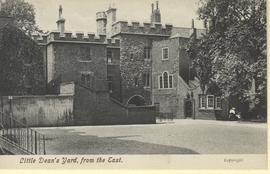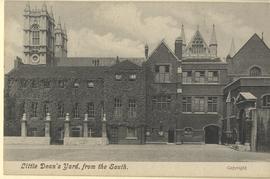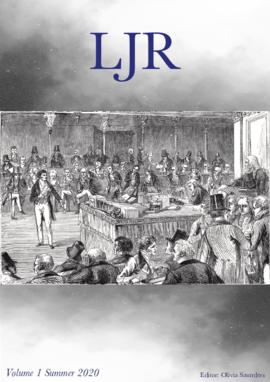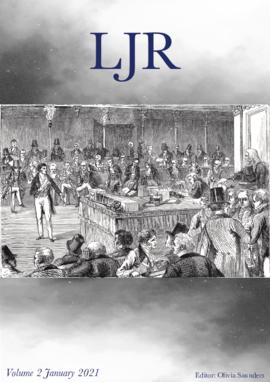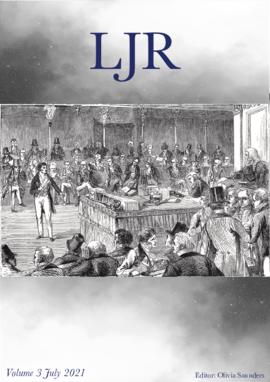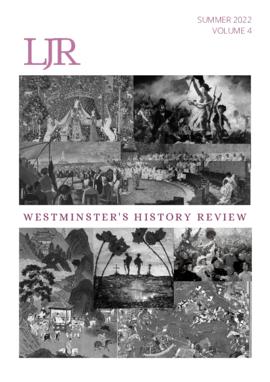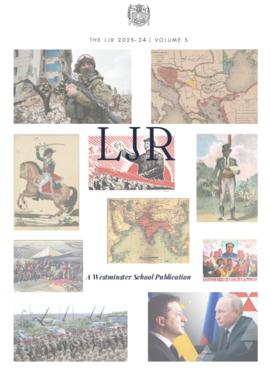One copy annotated on reverse by R.S. Chalk, as follows:
'1919-1924
On the right (then as to this day I hope) is Liddell’s tree. Beneath it the tiny and cramped Bursar’s Office, where the devoted and conscientious but unsystematical JJ Tyson (Ti Ti) laboured six days a week throughout the year (never a holiday save half-a-day for Diamond Jubilee, 1897). Report had it this Office was in such confusion that the Pashley Bowling Cup was mislaid there for 3 years, under piles of files, letters and records.
On the ground floor (hidden in picture by the Fives Courts) was the Masters’ Common Room - fittingly described to me by Mr. Smedley when once I appeared at its doorway on urgent business as “The Holy of Holies”
Above it (17 Dean’s Yard) was H.BB (now Wren’s, I think - but surely Wren was never a House Master, like Rigaud?)
It always puzzled me how 80+ Home Boarders fitted in there, complete (presumably) with Upper and Under. H.BB in my day were a boisterous House, but good-hearted - more congenial generally than A.HH (I speak of course as a K.S!)'
One copy annotated on reverse by R.S. Chalk, as follows:
'1918-1924 Ashburnham House & (formerly) Turle’s House
Easily the most attractive aspect of Yard. (Note abundant Virginia Creeper. A pity those ball-topped pillars were removed not long after my time.)
From left to right:
(Ground Floor) A.HH (the largest of the five Houses) with 90+ Day boys): Suts (by door); Notice-boards/ Orderly Room (?): entrance to Dark Cloister, Armoury & Gym.
(First Floor) Lib: Classical Under & Upper Shell Form Rooms (the latter nearest School)
(Top Floor-originally Servants’ quarters) Various Class-rooms, including IV, and (nearest School) Music Room.
(These were not all originally built for the purpose and would be considered totally unsuitable in any Comprehensive School today!)
Yard was laid half with yellow gravel, half with flag-stones; on the latter K.SS still played the obsolescent game of ‘Woodens’, tho’ rather half-heartedly.'
[00:20] First impressions of Westminster School. [00:38] Masters very nice. Challenge anecdote. [01:09] Day boy in Ashburnham. [01:58] Lushington as form tutor. [02:12] Leaving to have operation. Away for a long time. [02:50] Couldn’t play football. Lots of swimming instead. [03:10] Commute from Putney. [03:30] Masters. John Morton Wilson. Latin prose. [04:30] Enjoyed science. [05:04] Cyril John Crumpler, science Master. Mr Foxcroft. [05:35] Another pupil by the name of Hunt, connecting water tap to gas tap. Fire brigade called. [06:18] Experiments. [06:30] False roof up school. Latin prayers. [07:07] Walter Hamilton. Greek. [07:48] Joined the Corps. War still felt close. [08:10] Mr Brock, housemaster of Ashburnham. Telling stories of war. [08:50] Demonstrations at Hyde Park Corner on Sundays. [09:05] Art teacher. Mr Spore. Wanted to talk about naval history. [09:42] Francis Rause, housemaster of Busby’s. Major in war. Told stories, told back to him in House play at the end of term. [11:10] Matthew Orr, played piano in Busby’s. [11:52] Boys climbing lifts in Busby’s. Used later while stuck in lift in France. [13:22] Noel Picarda, used to go up to Hyde Park Corner with collar back to front and give mock religious sermons. [14:15] Talks at political literary (John Locke) society. C.P. Snow, speaking about Russia. Ted Heath. [16:32] Choice of science. [16:43] Dropped Greek to do science, mother horrified. [16:55] 3 In Maths Sixth. 27 in Classics. [17:25] College scholars primarily classicists. [17:49] Theo Zinn classicist. Did music appreciation. [18:40] Classists saw themselves as the elite in the school. Seemed to be the way things were, no real resentment. [19:45] Labs in Sutcliffe’s on Great College Street. Nothing to compare them to. Not pristine, didn’t feel like it was a disaster to take risks. [20:40] Slide rules for calculations. [21:08] Lack of health and safety. No safety glasses. [21:30] Not too much building work. Felt done. Dorms of 17 in Busby’s. Throwing slippers. [22:15] Fagging. Appalling. Abolished at sixth form. Busby’s first house to do so. [22:44] Sixth formers only ones to use the lift. As prefect, let everyone. [23:40] Football. C.C.P. Williams. Broke a window in Vincent Square. Westminster not particularly successful in sport. Played Chelsea Colts once a year. [25:20] Sanger. Playing cricket. [25:50] Walter Hamilton. Left for Rugby. John Carleton’s takeover. Didn’t have the respect Hamilton had. [26:55] Confirmation, conversation with Head Master. [28:05] Respect for Walter Hamilton. Strong character. Carleton charming, liked by parents. Not by students. Surprising Westminster did as well as it did under him. [29:25] Lushington speaking after Carleton in staff meetings. [30:33] Fisher, teaching mathematics. Had been a bas headmaster of Busby’s, but good teacher of mathematics. Wanted students to go to Cambridge, measured progress by it. Deterministic. Connecting mathematics to the world. [32:27] Adolph Prag. Helped with archives. From Germany. Mathematics as patterns and logic and beauty. Class of three, later four. Had to explain proof on blackboard. [33:35] Henry Christie, master of the scholars. Keen on rowing. [34:05] Reading divorce cases in the Daily Telegraph. Westminster handled change easily. [35:10] Going to parliament. Concerts at Festival Hall. [35:48] Strength of connection between Westminster and Trinity. 10 boys in same year passed up to Trinity. Not much of a Westminster society there. [36:55] Went to Trinity to follow footsteps of grandfather and uncle. [37:20] Dan McKenzie most brilliant in year. One of the discoverers of continental drift. Divinity class. Dan state disbelief in God ‘because I am a scientist’. Became Cambridge professor and Fellow of Royal Society. [40:42] Science as a group. Keeley, gave classes in Urdu. [42:05] Science education post-Westminster. Dropped Greek. Science was a way of connecting things together. Royal Institute lectures. Felt inferior to scientists, decided to go into engineering. [43:45] At Cambridge. Engineering as ‘mechanical sciences’. PhD. More interested in environmental matters. Turbulent flows. Supposed to go to America, but met wife and didn’t want to leave her behind. [47:00] In America during Vietnam war. March on Washington. Science and politics. [48:18] Most Old Westminsters had standard careers. [51:22] The usefulness of scientific ideas. [53:10] More public understanding of science. More media coverage. [56:00] Much wider range of A Levels now, less specialised. [56:40] Far more pupils doing science at A Level. [57:10] Changes in science teaching. Less time to just experiment. Broader syllabus now, but strictly organised. [01:00:05] St Paul’s closest UK comparison to Westminster. Special. [01:10:18] Westminster very institutional. Used to it. Boarding school from the age of nine or ten. One younger brother enjoyed it, but youngest did not.
